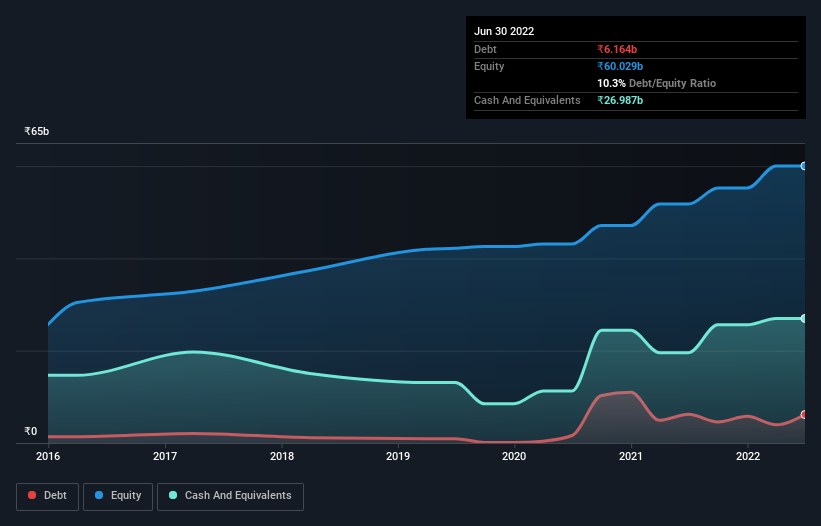
Howard Marks put it nicely when he said that, rather than worrying about share price volatility, 'The possibility of permanent loss is the risk I worry about... and every practical investor I know worries about.' So it seems the smart money knows that debt - which is usually involved in bankruptcies - is a very important factor, when you assess how risky a company is. We can see that Havells India Limited (NSE:HAVELLS) does use debt in its business. But is this debt a concern to shareholders?
Why Does Debt Bring Risk?
Debt is a tool to help businesses grow, but if a business is incapable of paying off its lenders, then it exists at their mercy. In the worst case scenario, a company can go bankrupt if it cannot pay its creditors. While that is not too common, we often do see indebted companies permanently diluting shareholders because lenders force them to raise capital at a distressed price. Of course, plenty of companies use debt to fund growth, without any negative consequences. The first thing to do when considering how much debt a business uses is to look at its cash and debt together.
View our latest analysis for Havells India
What Is Havells India's Net Debt?
As you can see below, Havells India had ₹6.16b of debt, at March 2022, which is about the same as the year before. You can click the chart for greater detail. However, its balance sheet shows it holds ₹27.0b in cash, so it actually has ₹20.8b net cash.

How Strong Is Havells India's Balance Sheet?
We can see from the most recent balance sheet that Havells India had liabilities of ₹36.3b falling due within a year, and liabilities of ₹8.87b due beyond that. Offsetting this, it had ₹27.0b in cash and ₹8.29b in receivables that were due within 12 months. So its liabilities total ₹9.93b more than the combination of its cash and short-term receivables.
Having regard to Havells India's size, it seems that its liquid assets are well balanced with its total liabilities. So it's very unlikely that the ₹843.3b company is short on cash, but still worth keeping an eye on the balance sheet. Despite its noteworthy liabilities, Havells India boasts net cash, so it's fair to say it does not have a heavy debt load!
On the other hand, Havells India saw its EBIT drop by 3.2% in the last twelve months. If earnings continue to decline at that rate the company may have increasing difficulty managing its debt load. The balance sheet is clearly the area to focus on when you are analysing debt. But ultimately the future profitability of the business will decide if Havells India can strengthen its balance sheet over time. So if you're focused on the future you can check out this free report showing analyst profit forecasts.
Finally, a company can only pay off debt with cold hard cash, not accounting profits. Havells India may have net cash on the balance sheet, but it is still interesting to look at how well the business converts its earnings before interest and tax (EBIT) to free cash flow, because that will influence both its need for, and its capacity to manage debt. Over the most recent three years, Havells India recorded free cash flow worth 77% of its EBIT, which is around normal, given free cash flow excludes interest and tax. This cold hard cash means it can reduce its debt when it wants to.
Summing Up
While it is always sensible to look at a company's total liabilities, it is very reassuring that Havells India has ₹20.8b in net cash. The cherry on top was that in converted 77% of that EBIT to free cash flow, bringing in ₹15b. So we don't think Havells India's use of debt is risky. When analysing debt levels, the balance sheet is the obvious place to start. However, not all investment risk resides within the balance sheet - far from it. To that end, you should be aware of the 1 warning sign we've spotted with Havells India .
At the end of the day, it's often better to focus on companies that are free from net debt. You can access our special list of such companies (all with a track record of profit growth). It's free.
Valuation is complex, but we're here to simplify it.
Discover if Havells India might be undervalued or overvalued with our detailed analysis, featuring fair value estimates, potential risks, dividends, insider trades, and its financial condition.
Access Free AnalysisHave feedback on this article? Concerned about the content? Get in touch with us directly. Alternatively, email editorial-team (at) simplywallst.com.
This article by Simply Wall St is general in nature. We provide commentary based on historical data and analyst forecasts only using an unbiased methodology and our articles are not intended to be financial advice. It does not constitute a recommendation to buy or sell any stock, and does not take account of your objectives, or your financial situation. We aim to bring you long-term focused analysis driven by fundamental data. Note that our analysis may not factor in the latest price-sensitive company announcements or qualitative material. Simply Wall St has no position in any stocks mentioned.
About NSEI:HAVELLS
Havells India
A fast-moving electrical goods company, manufactures, trades in, and sells various consumer electrical and electronic products in India and internationally.
Flawless balance sheet with reasonable growth potential and pays a dividend.

